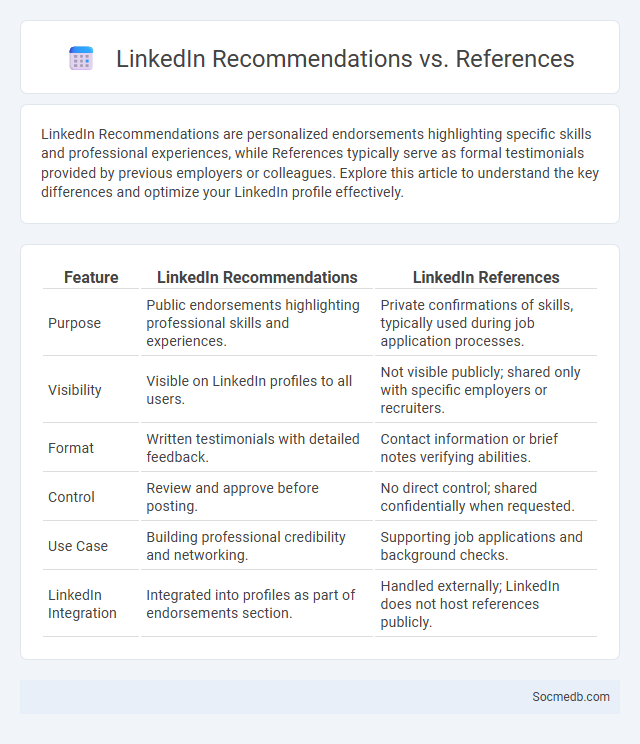
Photo illustration: LinkedIn Recommendations vs References
LinkedIn Recommendations are personalized endorsements highlighting specific skills and professional experiences, while References typically serve as formal testimonials provided by previous employers or colleagues. Explore this article to understand the key differences and optimize your LinkedIn profile effectively.
Table of Comparison
| Feature | LinkedIn Recommendations | LinkedIn References |
|---|---|---|
| Purpose | Public endorsements highlighting professional skills and experiences. | Private confirmations of skills, typically used during job application processes. |
| Visibility | Visible on LinkedIn profiles to all users. | Not visible publicly; shared only with specific employers or recruiters. |
| Format | Written testimonials with detailed feedback. | Contact information or brief notes verifying abilities. |
| Control | Review and approve before posting. | No direct control; shared confidentially when requested. |
| Use Case | Building professional credibility and networking. | Supporting job applications and background checks. |
| LinkedIn Integration | Integrated into profiles as part of endorsements section. | Handled externally; LinkedIn does not host references publicly. |
Understanding LinkedIn Recommendations
LinkedIn recommendations serve as powerful social proof, enhancing your professional credibility by showcasing genuine endorsements from colleagues, clients, or mentors. These testimonials highlight specific skills and accomplishments, making your profile more attractive to recruiters and potential business partners. Leveraging your LinkedIn recommendations effectively can boost your networking opportunities and help accelerate your career growth.
What Are Professional References?
Professional references are individuals who can vouch for your work experience, skills, and character in a professional setting, often including former supervisors, colleagues, or clients. In the context of social media, selecting references who maintain a credible online presence can enhance your professional image and validate your expertise. These references provide potential employers or recruiters with trusted insights, supporting your employment or networking opportunities.
Defining Social Proof in Career Building
Social proof in career building refers to the validation and credibility your professional reputation gains through endorsements, recommendations, and visible achievements on social media platforms like LinkedIn. It leverages peer approval and influential networks to showcase your skills and experience, enhancing your employability and growth opportunities. Understanding how to strategically build and display social proof can significantly impact Your career trajectory by attracting potential employers and collaborators.
Key Differences: Recommendations vs References
Recommendations on social media are explicit endorsements highlighting your satisfaction with a product or service, often accompanied by personal experiences and positive outcomes. References tend to be more formal, typically serving as professional verifications or testimonials that validate your skills or qualifications. Understanding these distinctions helps you tailor content appropriately, enhancing credibility and engagement on your platforms.
How Social Proof Differs from Recommendations
Social proof relies on the behavior and endorsements of a group, showing how many people like or use a product, which influences your perception through widespread approval. Recommendations are personalized endorsements from trusted individuals, offering specific advice based on their own experiences. Understanding the difference helps you leverage both social proof for broad appeal and recommendations for targeted trust-building in your social media strategy.
The Role of LinkedIn Recommendations in Job Searches
LinkedIn recommendations significantly enhance your job search by showcasing authentic endorsements from colleagues and supervisors, reinforcing your professional credibility. These personalized testimonials improve your profile's visibility in recruiter searches and provide tangible evidence of your skills and work ethic. Leveraging LinkedIn recommendations effectively can differentiate your application in a competitive job market.
When to Use References Over Recommendations
References should be used when you need detailed, verified evidence to support claims, providing concrete proof of expertise or experience. Recommendations are more appropriate for personal endorsements reflecting opinions or experiences, offering a softer, subjective perspective. Your content gains credibility by balancing references for factual accuracy and recommendations for trust-building engagement.
Leveraging Social Proof on LinkedIn Profiles
Leveraging social proof on LinkedIn profiles enhances credibility by showcasing endorsements, recommendations, and professional achievements that validate expertise. Including client testimonials, peer endorsements, and quantifiable project results increases trust and attracts potential employers or business partners. Highlighting participation in industry-specific groups and sharing thought leadership content further establishes authority and expands professional networks.
Best Practices for Requesting Recommendations and References
When requesting recommendations and references on social media, personalize your message to clearly state the purpose and highlight specific skills or experiences you want emphasized. You should target connections who are familiar with your work and can provide credible, detailed feedback that aligns with your professional goals. Maintaining a polite tone and offering to reciprocate the favor encourages positive responses and strengthens your professional network.
Maximizing Career Success with All Three
Mastering the use of Facebook, LinkedIn, and Twitter can significantly maximize your career success by expanding your professional network and enhancing your personal brand visibility. Leveraging LinkedIn's industry groups, Twitter's real-time updates, and Facebook's community pages allows you to access job opportunities, industry insights, and connect with key influencers. By strategically engaging across all three platforms, your professional presence becomes more dynamic and attractive to recruiters and collaborators.
 socmedb.com
socmedb.com